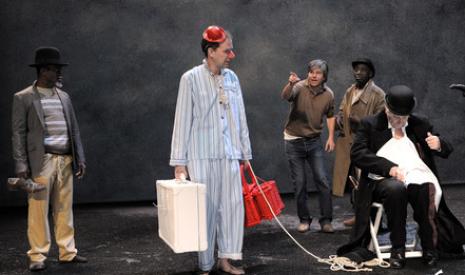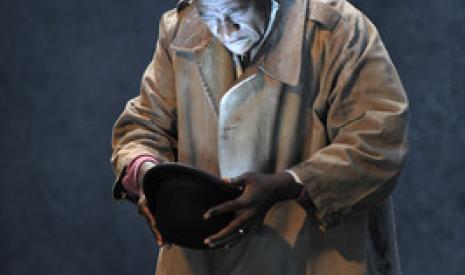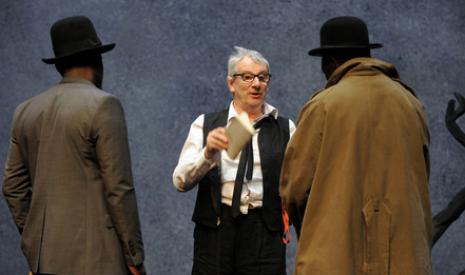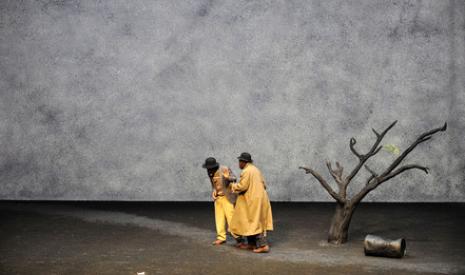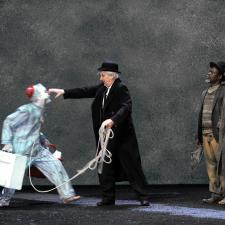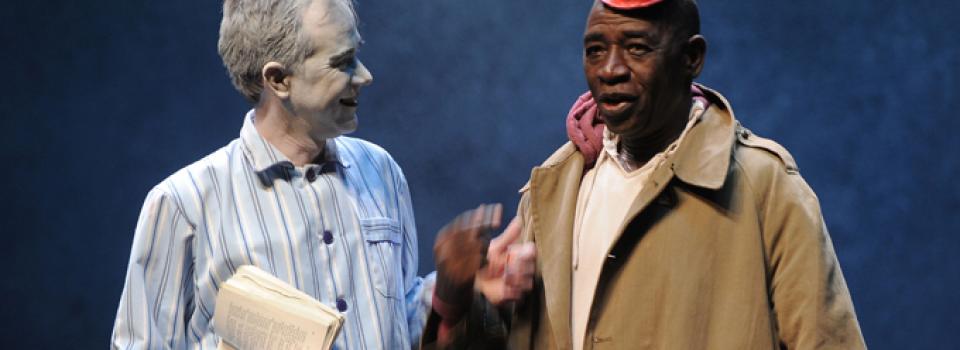
"WAITING FOR GODOT" AT COMÉDIE DE CAEN #2
Jean Lambert-wild, co-author of this logbook with Lorenzo Malaguerra, is one of the three artists directing the show. He also plays the part of Lucky.
Three of us are directing this piece, but make no mistake: Beckett’s writing is what actually decides how it is staged. To collectively oversee the completion of a piece enrich both our movements and our gaze. The question is not just to achieve what we aim to do, but also to know how we will do so.
The way we move is not the result of one unique thought process. It is composed of our combined experiences, the mechanics of our doubts, from how conscious we are of the audience, from the hopes we have for theatre. The play’s score is policed by our shared way of listening. This method means one’s imagination isn’t trapped under a magnifying glass.
In the centre, Jean Lambert-wild, “Our days are dense” © Tristan Jeanne-Valès
Our conversations are tight, always a tad cheeky
The three of us create a prism: the way we see reality is reinforced. Beckett’s lights break down into different hues and a wider spectrum. We train day after the day our ways of listening and seeing. The point is not to become a collective, but to create an alloy of our interpretations. Our conversations are tight, always a tad cheeky. We activate our curiosity with readings, anecdotes, ferocious demands, silent affections, emotional peaks as well as dips in details, infinite details that make up the farce full of tragic laughter that is Waiting for Godot.
Michel Bohiri © Tristan Jeanne-Valès
We go forward, a three-person roped party
Each one of our mutual attention sews friendship, and even further, protects the innocence of our gestures. If one of us gets lost, if two of us even, arm in arm, get lost, then there is always a third one to politely tell them… and since it is necessary to get lost in order to find what we are looking for, we go forward, like a three-person roped party, encouraging one another to do, undo, do again, until a path appears in front of our eyes.
Silences in theatre create a need for someone else. Waiting for someone feeds the memory we have of our existence. The strange bonds that link performers with audience members come out of the attachment that performers have with their partners, who will be their sole allies when they face the adversity of their parts.
- POZZO (…) but are you friends?
- ESTRAGON (laughing noisily) – He wants to know if we are friends!
- VLADIMIR No, he means friends of his.
- ESTRAGON Well?
- VLADIMIR We’ve proved we are, by helping him.
- ESTRAGON Exactly. Would we have helped him if we weren’t his friends?
The musical requirements of Beckett’s text
Our days are dense. Preparing each moment of performance as well as the movements of the wider ensemble is only possible through repetitive and regular attention. Beckett’s text is musically demanding, which requires a scrupulous interpretation. We each spend time meticulously working on our scores.
Marcel Bozonnet © Tristan Jeanne-Valès
We follow Beckett’s directions to the letter. We picked a location that doesn’t belong to any specific era. It is a burnt, charred land, surrounded by painted backdrops that hide from us the surrounding horror of a landscape of mass graves.
We think that we must respect Samuel Beckett’s directions, and this decision only serves to unveil the concrete aspects of the play. We can see that not everything in the text is absurd, that everything at play here is very concrete.
We have paid a lot of attention to Beckett’s stage directions: the road, the tree, the backdrop, the blocking, as well as the bowler hats connected to clowns’ antics. Through his directions, Beckett gives us freedom to interpret his text. It is precisely the constraints set by Beckett that make this text so modern.
Paying attention to Beckett’s stage directions © Tristan Jeanne-Valès
To return to these constraints, and therefore, to the origins of the text allows us to free ourselves from all the readings of the play that were done before us. We hope to make a show that uses many different performance codes and where the concrete dimension of the situations depicted will reveal Beckett as both funny and tragic.
- "WAITING FOR GODOT" AT COMÉDIE DE CAEN #9
- "WAITING FOR GODOT" AT COMÉDIE DE CAEN #8
- "WAITING FOR GODOT" AT COMÉDIE DE CAEN #7
- "WAITING FOR GODOT" AT COMÉDIE DE CAEN #6
- "WAITING FOR GODOT" AT COMÉDIE DE CAEN #5
- "WAITING FOR GODOT" AT COMÉDIE DE CAEN #4
- "WAITING FOR GODOT" AT COMÉDIE DE CAEN #3
- "WAITING FOR GODOT" AT COMÉDIE DE CAEN #2
- "WAITING FOR GODOT" AT COMÉDIE DE CAEN #1

